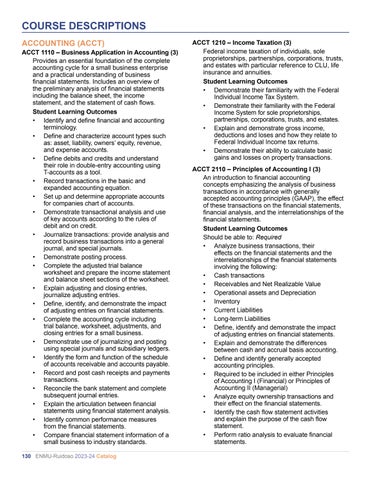COURSE DESCRIPTIONS ACCOUNTING (ACCT)
ACCT 1110 – Business Application in Accounting (3) Provides an essential foundation of the complete accounting cycle for a small business enterprise and a practical understanding of business financial statements. Includes an overview of the preliminary analysis of financial statements including the balance sheet, the income statement, and the statement of cash flows. Student Learning Outcomes • Identify and define financial and accounting terminology. • Define and characterize account types such as: asset, liability, owners’ equity, revenue, and expense accounts. • Define debits and credits and understand their role in double-entry accounting using T-accounts as a tool. • Record transactions in the basic and expanded accounting equation. • Set up and determine appropriate accounts for companies chart of accounts. • Demonstrate transactional analysis and use of key accounts according to the rules of debit and on credit. • Journalize transactions: provide analysis and record business transactions into a general journal, and special journals. • Demonstrate posting process. • Complete the adjusted trial balance worksheet and prepare the income statement and balance sheet sections of the worksheet. • Explain adjusting and closing entries, journalize adjusting entries. • Define, identify, and demonstrate the impact of adjusting entries on financial statements. • Complete the accounting cycle including trial balance, worksheet, adjustments, and closing entries for a small business. • Demonstrate use of journalizing and posting using special journals and subsidiary ledgers. • Identify the form and function of the schedule of accounts receivable and accounts payable. • Record and post cash receipts and payments transactions. • Reconcile the bank statement and complete subsequent journal entries. • Explain the articulation between financial statements using financial statement analysis. • Identify common performance measures from the financial statements. • Compare financial statement information of a small business to industry standards. 130 ENMU-Ruidoso 2023-24 Catalog
ACCT 1210 – Income Taxation (3) Federal income taxation of individuals, sole proprietorships, partnerships, corporations, trusts, and estates with particular reference to CLU, life insurance and annuities. Student Learning Outcomes • Demonstrate their familiarity with the Federal Individual Income Tax System. • Demonstrate their familiarity with the Federal Income System for sole proprietorships, partnerships, corporations, trusts, and estates. • Explain and demonstrate gross income, deductions and loses and how they relate to Federal Individual Income tax returns. • Demonstrate their ability to calculate basic gains and losses on property transactions. ACCT 2110 – Principles of Accounting I (3) An introduction to financial accounting concepts emphasizing the analysis of business transactions in accordance with generally accepted accounting principles (GAAP), the effect of these transactions on the financial statements, financial analysis, and the interrelationships of the financial statements. Student Learning Outcomes •
• • • • • • • • • • • • •
Analyze business transactions, their effects on the financial statements and the interrelationships of the financial statements involving the following: Cash transactions Receivables and Net Realizable Value Operational assets and Depreciation Inventory Current Liabilities Long-term Liabilities Define, identify and demonstrate the impact of adjusting entries on financial statements. Explain and demonstrate the differences between cash and accrual basis accounting. Define and identify generally accepted accounting principles. Required to be included in either Principles of Accounting I (Financial) or Principles of Accounting II (Managerial) Analyze equity ownership transactions and their effect on the financial statements. Identify the cash flow statement activities and explain the purpose of the cash flow statement. Perform ratio analysis to evaluate financial statements.

